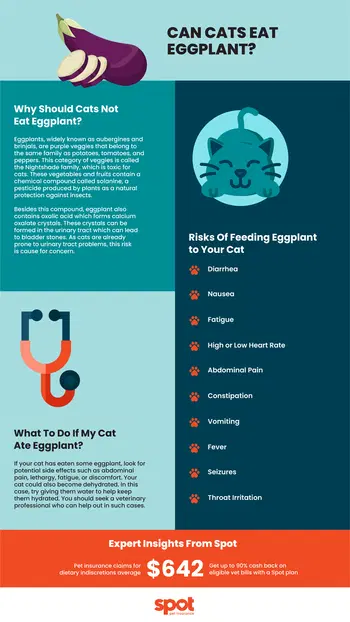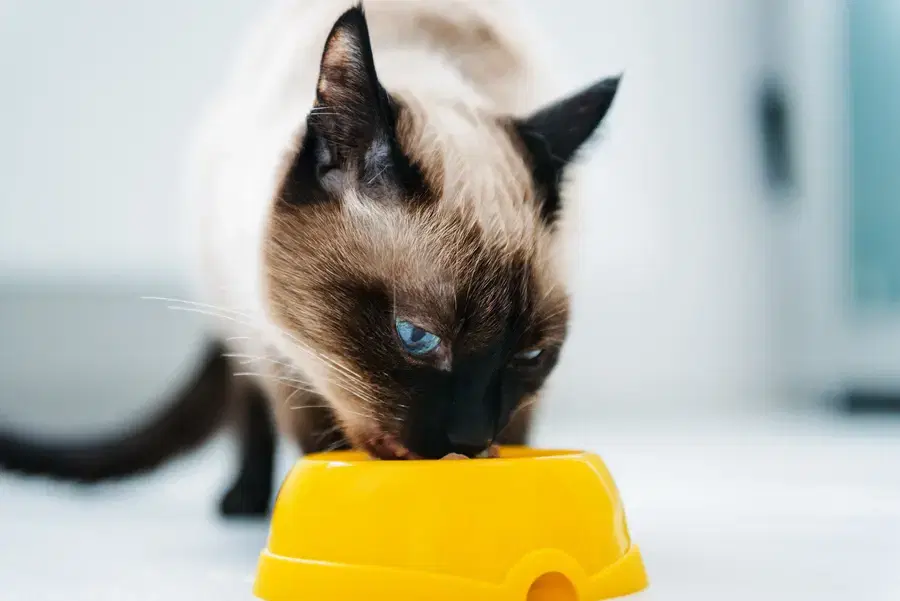Do you also wonder if you can share your meals with your cat? While many foods that we humans love can be shared with cats, there are some foods that you need to keep your cats away from. Eggplants are one of them. Your cat shouldn't eat eggplant, and there are several reasons why. We will talk about why cats should avoid eggplants and the potential risks of feeding them to your cat in this blog.

Why Should Cats Not Eat Eggplant?
Eggplants, widely known as aubergines and brinjals, are purple veggies that belong to the same family as potatoes, tomatoes, and peppers. This category of veggies is called the Nightshade family, which is toxic for cats. These vegetables and fruits contain a chemical compound called solanine, a pesticide produced by plants as a natural protection against insects.1
While you may find this chemical compound in leaves and stems, it can be transported to the fruit too. While your cat may not gobble up enough eggplant to experience the toxicity, it’s best to avoid it altogether.
Besides this compound, eggplant also contains oxalic acid which forms calcium oxalate crystals. These crystals can be formed in the urinary tract which can lead to bladder stones.2
Risks Of Feeding Eggplant to Your Cat
Feeding raw eggplant can be extremely harmful to your cat as cats can't break down the solanine present in eggplants. This is why, if they do eat raw eggplant, the chemical compound can build in their system and lead to health issues. If you suspect your cat has ingested a concerning amount of eggplant, you should monitor them closely for signs of distress.1
Some Symptoms to Look for:
Diarrhea
Nausea
Fatigue
High or low heart rate
Abdominal pain
Constipation
Fever
Seizures
Throat irritation
Cooking your eggplant can reduce the level of solanine, but even then, you still shouldn't add to your cat’s diet.
Moreover, if you have a smaller cat breed, or a little kitten, the effect of solanine will be far greater on them than on larger cats.2
What To Do If My Cat Ate Eggplant?
If you or your family savors eggplants quite often, there is only so much you can do to keep your cats away from your kitchen. Your curious cat may accidentally get a bite of your eggplant, which is why it is best to stay cautious and informed.
If your cat has eaten some eggplant, look for potential side effects such as abdominal pain, lethargy, fatigue, or discomfort. Your cat could also become dehydrated. In this case, try giving them water to help keep them hydrated.1 You should seek a veterinary professional who can help out in such cases.
When you connect with your vet, give them all the information you can. Let them know the amount of eggplant your cat ingested, the early signs of discomfort you noticed, and the cat’s overall diet.
Expert Insights From Spot
As much as we may want to spoil our cats with treats from our own plates, it's important to remember that some human foods can be harmful to pets. Spot's internal data indicates that pet insurance claims for dietary indiscretions average $642*, highlighting the need for careful consideration and research before offering cats any human food.
Tips for Your Cat’s Healthy Diet:
Cats are obligate carnivores which means they do not need fruits or vegetables as a source of protein. They thrive off animal-based proteins that are present in their cat food. Your cats need fatty acids and amino acids to thrive, so make sure their diet is full of them.
It is also important to keep your cat hydrated as they may not feel thirsty as often as other pets.
How Spot Pet Insurance Can Help
At Spot Pet Insurance, we want our pet parents to worry less about the costs attached to taking care of their pet. Our plans can help cover the unexpected costs related to accidents and illnesses with up to 90% cash back on eligible vet bills and access to a 24/7 Pet Telehealth helpline so that you can have someone by your side to guide you through questions about your cat’s behavior and health. Get a quote today!
Conclusion:
Eggplant is one of the foods a cat should always avoid. Eggplant is a source of both solanine and cyanide which puts your cat at potential health risks. If you suspect your cat has eaten eggplant, it's best to rush them to a vet for early signs of discomfort and treatment. The early signs you could detect are vomiting, nausea, digestion issues, and overall discomfort.
To help keep your cat safe and healthy, you should always rely on your store-bought, vet-recommended cat food, which is typically enough to give them the nutrients they need.

Creative manager by day, pet enthusiast all the time! After 19 years with my dog (hopefully he wins the award for oldest pet in the world), I enjoy spending my days brainstorming tail-wagging content, and sniffing out the latest trends in the pet world.
*Jan 2019 to Aug 2024 Spot Pet Insurance Services, LLC claims data.
"Adams, Christian. "Can Cats Eat Eggplant?" Catster, 19 Jun. 2025, https://www.catster.com/nutrition/can-cats-eat-eggplant/.
Kerr, Kerry-Ann. "Can Cats Eat Eggplant?" 08 October. 2025, https://articles.hepper.com/can-cats-eat-eggplant/.
The information presented in this article is for educational and informational purposes only and does not constitute or substitute for the advice of your veterinarian.












